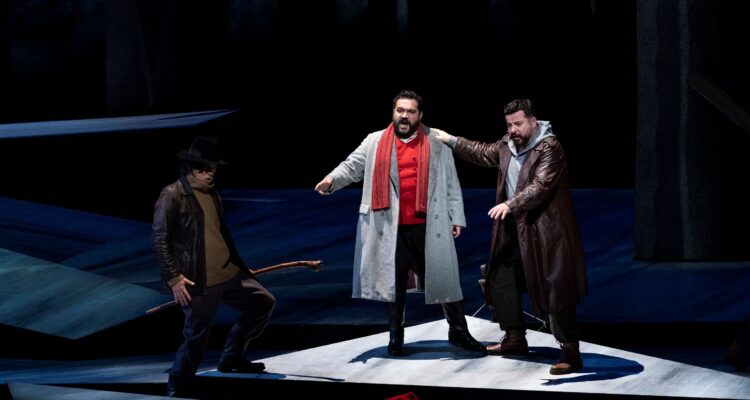Rossini’s final opera, Guillaume Tell, was recently staged at The New National Theatre Tokyo in its original French for the first time in Japan. Directed by French director Yannis Kokkos, the production did a wonderful job in bringing the masterpiece to life, deftly exploring Romantic themes of societal conflict, individual resilience, and the pursuit of freedom. Adapted from Friedrich Schiller’s play of the same name, the opera captures the cultural and emotional currents of its era, showcasing Rossini’s transition from comedic operas to the grandeur of Grand Opéra.
The trademarks of the Grand Opéra are seen in the large-scale choral and ballet sequences. The New National Theatre Chorus delivered a performance that was forceful and electrifying, embodying the spirit of unity and resistance central to the opera. The ballet served as more than mere interludes and became a part of the narrative, elevating the storytelling. The wedding ballet in Act 1 and the soldiers’ dance in Act 3, enhanced by the vivid visual tableaux, should particularly be praised.
Under the baton of Kazushi Ono, the orchestra captured the nuances and intensity of Rossini’s music. While the finale of Act 1 lacked some of the composer’s trademark vigour and energy, the later acts showcased a commanding interpretation of Rossini’s dynamic score.
Kokkos’ artistic vision was evident in the costume and set design. His stylish costumes balanced the idyllic tones of Switzerland with a recurring dark red accent, which added visual stimulation to every scene. The stage, evoking a mystical and fantastical medieval Switzerland, were complemented by evocative lighting, creating picturesque and atmospheric sets that transported the audience.
The cast breathed fresh life into Rossini’s characters, and were the highlight of this production. Baritone Gezim Myshketa plays Guillaume Tell with heartfelt humanity, capturing the character’s roles as a father, husband, and friend. René Barbera similarly brought depth to Arnold Melchtal, tactfully balancing his character’s internal conflict between love and duty. Olga Peretyatko shows the duality of Mathilde; the struggle between choosing her birthright and her forbidden love was palpable. Peretyatko and Barbera’s Act 2 duet, “Oui, vous l’arrachez à mon âme” struck an emotional chord with the audience.
The ensemble work was equally commendable. The Act 2 trio featuring Myshketa, Barbera, and Shingo Sudo (Walter) had persuasive intensity, strongly illustrating the characters’ fight for independence. Yoko Yasui (Jemmy) delivered a moving performance, and her duet with Junko Saito (Edwige) in Act 4 stood out as a moment of vocal and emotional beauty.
The dilapidated bombed building at the conclusion of the opera linked the historical themes of oppression and resistance to our present-day world, and underlined the enduring relevance of Guillaume Tell and the universality of its message. In Kokkos’ hands, this production bridged the spirit of Rossini’s time and our own, reminding us of the ongoing struggles for freedom and justice. The premiere of Guillaume Tell at the New National Theatre Tokyo was a triumph, offering an experience both deeply moving and visually stunning. It stands as a testament to the enduring power of Rossini’s grand vision.
Venue: New National Theatre Tokyo
Composer: Gioachino Rossini (1792-1868)
Libretto: Etienne de Jouy and Hippolyte Louis-Florent Blis, after Schiller.
Director, Costume and set designer: Yannis Kokkos
Conductor: Kazushi Ono
Choreographer: Natalie Van Parys
Lighting designer: Vincio Cheli
Cast includes Gezim Myshketa, René Barbera, Olga Peretyatko and Yoko Yasui
Until 30th November 2024
Photograph: ©Rikimaru Hotta/New National Theatre, Tokyo
Running Time: 4 hours 35 minutes including 2 intervals

